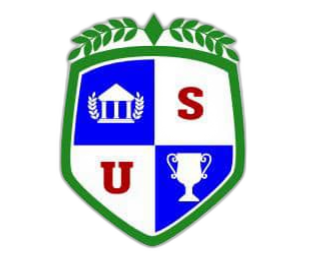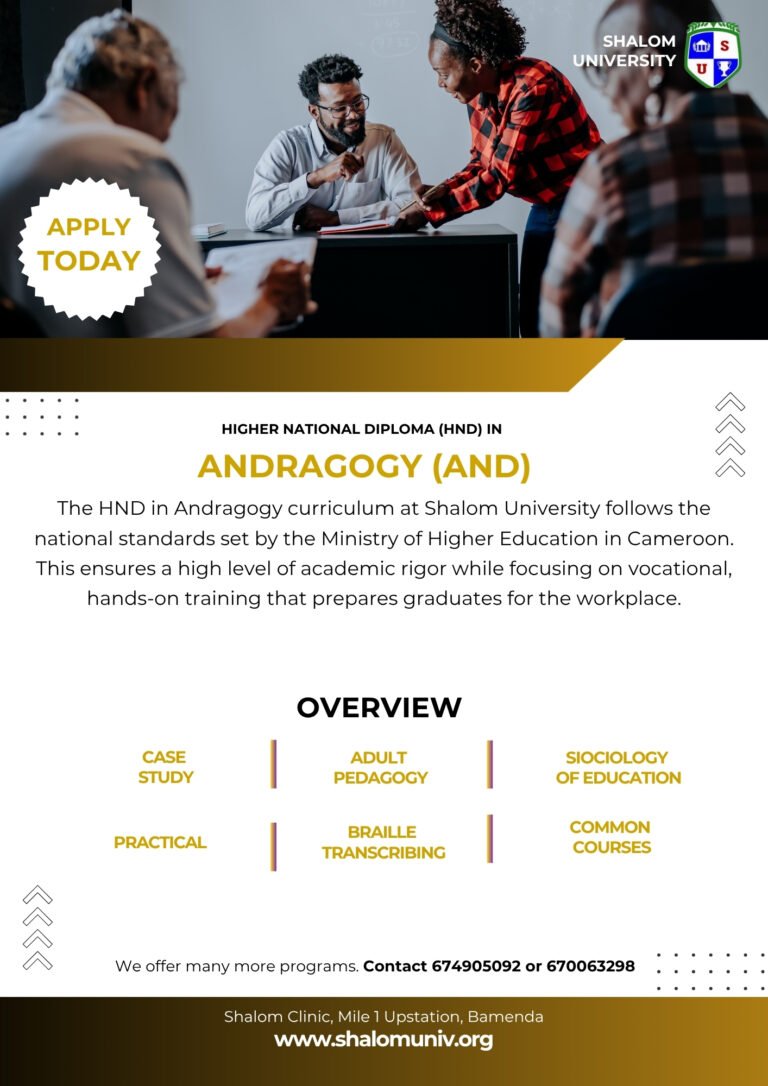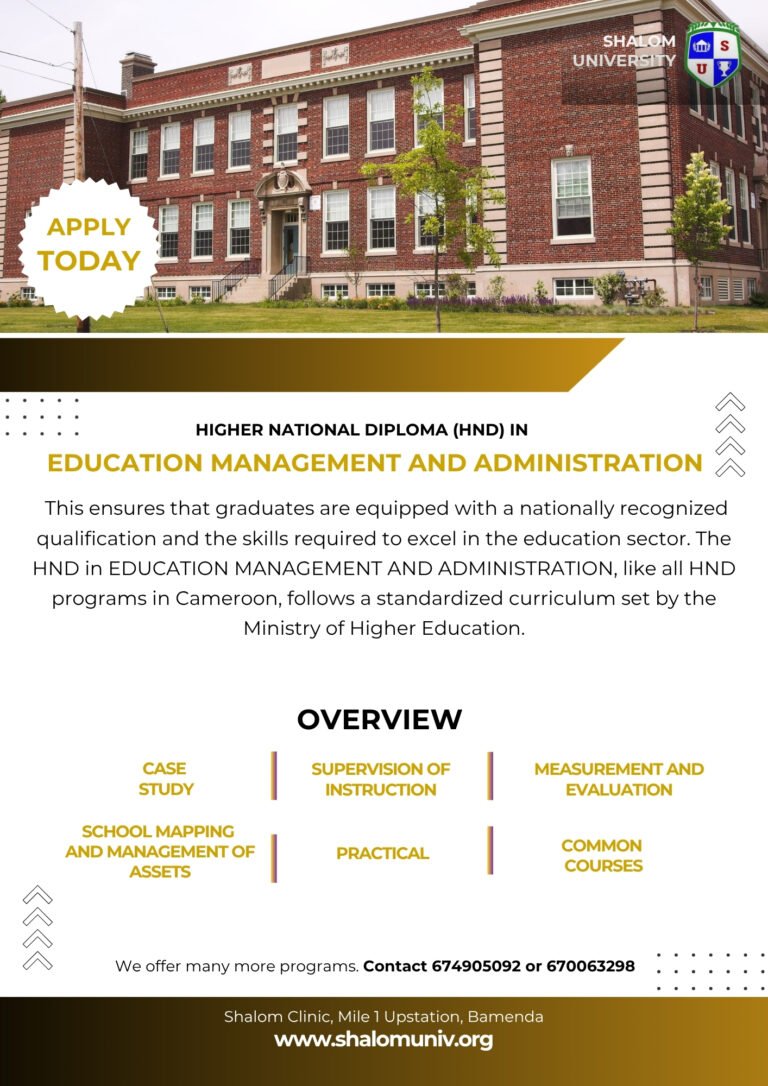In Cameroon, a nation that places a high premium on education as a cornerstone of development, the need for well-trained and innovative teachers is paramount. The quality of education is directly linked to the skills and dedication of its educators, who are responsible for shaping the minds of future generations. The HND in Didactics, Curriculum Development and Teaching (DCT) at Shalom University in Bamenda is designed to train these essential professionals. This program provides aspiring teachers with the theoretical knowledge and practical teaching skills needed to excel in Cameroon’s diverse educational landscape.
The curriculum at Shalom University is tailored to the Cameroonian context, blending foundational educational theory with practical application and an understanding of the specific challenges and opportunities within the local school system. Graduates are prepared not only to deliver effective lessons but also to contribute to curriculum development and manage educational processes, ensuring they are well-equipped to drive positive change in the nation’s schools.
The DCT Curriculum at Shalom University
The HND in Didactics, Curriculum Development and Teaching program at Shalom University is structured around a set of core papers that provide a comprehensive and practical education in the field.
Paper: Case Study
The Case Study paper is a vital component that integrates all the theoretical knowledge and practical skills gained throughout the program. It challenges students to analyze complex educational scenarios, from managing a classroom with diverse learning needs to implementing new curriculum changes. This is particularly relevant for teachers in Cameroon, who must navigate varying school resources, cultural backgrounds, and learning environments.
The course trains students to:
- Analyze real-world educational challenges: Based on a given case, students evaluate teaching effectiveness, student performance, or classroom management issues faced in a Cameroonian school setting.
- Identify critical issues: They pinpoint specific problems related to curriculum delivery, student engagement, assessment strategies, or teacher-student interactions.
- Propose evidence-based solutions: Students formulate practical recommendations based on pedagogical principles, educational psychology, and curriculum development theories. For example, a case study might involve a classroom with low literacy levels and propose a new didactic approach using locally relevant materials and teaching methods.
- Defend their decisions: During formal presentations, students must justify their analysis and proposed solutions, demonstrating their critical thinking and communication skills, which are essential for effective teaching and collaboration with colleagues.
Paper: Management of Education
This paper provides students with an understanding of the administrative and leadership aspects of education. While primarily focused on teaching, a grasp of educational management principles is valuable for all teachers, especially in Cameroon where many may assume leadership roles in schools or educational projects.
Key topics include:
- School Administration: The functions of a school administrator, including planning, organizing, and managing school resources and personnel.
- Educational Policy in Cameroon: An overview of national educational policies and their impact on schools and curriculum development.
- Resource Management: Effective management of teaching and learning resources, including textbooks, materials, and technology, within a resource-constrained environment.
- Teacher Professional Development: The importance of and strategies for ongoing professional development for teachers.
Paper: Curriculum
This paper delves into the theory and practice of curriculum design, development, and implementation. It provides students with the skills to understand existing curricula and to adapt or develop new ones that are relevant and effective for the Cameroonian context.
The curriculum covers:
- Curriculum Theory: The foundational theories and models of curriculum development.
- Curriculum Design: The process of designing and structuring curriculum, including setting learning objectives, selecting content, and organizing learning experiences.
- Curriculum Implementation: Strategies for effectively implementing a new or revised curriculum in the classroom.
- Localization of Curriculum: Adapting and contextualizing national curricula to reflect local cultures, languages, and contexts in Cameroon.
Paper: Foundations of Education (Common for DCT-EMA-AND)
This common paper provides a broad, foundational understanding of the principles that underpin education. It is shared with students in other educational management and development programs, fostering a common base of knowledge.
Key topics include:
- History of Education: Key historical developments in education and their impact on modern educational systems, both globally and in Cameroon.
- Educational Psychology: Theories of learning, motivation, and child development, and their application to classroom practice.
- Sociology of Education: The relationship between education and society, including issues of social equity, access, and education’s role in social mobility.
- Philosophy of Education: An exploration of different philosophical perspectives on the purpose and goals of education.
Paper: Measurement and Evaluation (Common for DCT-EMA-AND)
This paper is crucial for effective teaching, as it provides students with the skills to assess student learning and evaluate the effectiveness of teaching strategies. It is also shared with other educational management students.
The curriculum covers:
- Principles of Assessment: The principles of valid, reliable, and fair assessment.
- Assessment Techniques: Various techniques for assessing student learning, including formative and summative assessments, standardized tests, and alternative assessment methods.
- Test Construction: The process of constructing effective and reliable classroom tests.
- Data Analysis: Basic statistical analysis of assessment data to evaluate student performance and teaching effectiveness.
Paper: Teaching Practice
This is the hands-on, clinical training component of the program, where students apply their theoretical knowledge in a supervised, real-world classroom setting. Practical experience is fundamental to developing the competencies needed for effective teaching.
The practical training includes:
- Micro-Teaching: Practicing teaching skills in a simulated classroom environment with peers.
- Supervised Teaching: Undergoing supervised teaching placements in schools in Cameroon, gaining direct experience with students, curricula, and school environments.
- Lesson Planning: Developing and delivering effective lesson plans that are engaging, well-structured, and aligned with curriculum objectives.
- Classroom Management: Practical experience in managing classroom behavior, fostering a positive learning environment, and addressing student needs.
Shaping Tomorrow’s Leaders
Graduates of the HND in Didactics, Curriculum Development and Teaching from Shalom University are well-prepared to enter the teaching profession in various roles across Cameroon’s educational system. They can serve as primary or secondary school teachers, curriculum developers, or educational administrators in public, private, or mission schools. Their proficiency in pedagogical principles, curriculum design, assessment strategies, and classroom management, coupled with a deep understanding of the Cameroonian context, makes them invaluable assets to the education sector. The Case Study paper ensures that they are not just theoretically sound but also adept at applying their knowledge to solve real-world educational challenges. By providing a practical and contextually relevant education, Shalom University plays a significant role in nurturing the teaching expertise crucial for building a stronger and more vibrant educational future for Cameroon.




